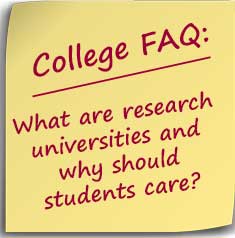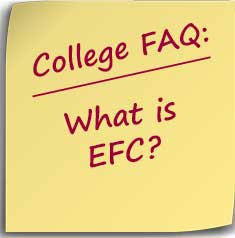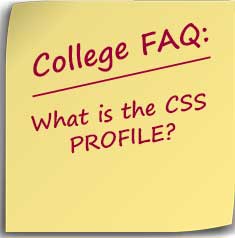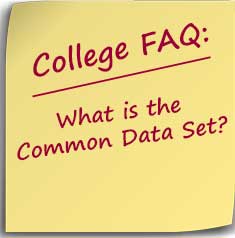 The sweet spot for studying for the SAT & ACT is eight to twelve weeks. Students who give themselves less than 8 weeks to study for the SAT but are expecting to improve by more than 100 points are not giving themselves adequate time to reach their goals. Students studying for more than 3 months are likely to see diminishing returns from their hard work.
The sweet spot for studying for the SAT & ACT is eight to twelve weeks. Students who give themselves less than 8 weeks to study for the SAT but are expecting to improve by more than 100 points are not giving themselves adequate time to reach their goals. Students studying for more than 3 months are likely to see diminishing returns from their hard work.
FAQ
FAQ: What are research universities and why should students care?
 Defining a Research University
Defining a Research University
Research Universities are Large
Research Universities are Focused on Faculty Research
Best Research Opportunities
List of Research Universities in the United States
Defining a Research University
A research university is simply a type of university that conducts more research relative to other colleges and universities. American universities are defined as research universities by the Carnegie Classification of Doctoral Universities. A university is considered a Doctoral University if it
- awards at least 20 research/scholarship doctoral degrees
- or awards at least 30 professional practice doctoral degrees in at least two programs.
To meet the “High research activity” or “Very high research activity,” the Doctoral University must:
- award at least 20 research/scholarship doctoral degrees and
- had at least $5 million in total research expenditures.
If you define research universities as only those with “Very high research activity,” there are only 130 in the United States. These are pretty much the most recognizable names in higher education including private institutions such as:
FAQ: What is EFC (Expected Family Contribution)?
 EFC stands for expected family contribution. This is the amount of money families are expected to pay for their students to attend college. Colleges and federal and state governments use the EFC to calculate a student’s financial aid award. The basic theory is that the lower your EFC, the bigger your financial aid award. A family with an adjusted income of $50,000 and two dependents would expect to have an EFC of around $3,800 without considering any other financial assets. A family with income of $100,000, would have an EFC of approximately $20,000.
EFC stands for expected family contribution. This is the amount of money families are expected to pay for their students to attend college. Colleges and federal and state governments use the EFC to calculate a student’s financial aid award. The basic theory is that the lower your EFC, the bigger your financial aid award. A family with an adjusted income of $50,000 and two dependents would expect to have an EFC of around $3,800 without considering any other financial assets. A family with income of $100,000, would have an EFC of approximately $20,000.
What is the CSS PROFILE? The Other Financial Aid Form
 The CSS PROFILE is basically a non-governmental financial aid application administered by the College Board, the same people who bring you the SAT and the AP Exams. Although used by some scholarship programs and graduate schools (the CSS stands for College Scholarship Service), it is more commonly used by over 200 colleges to determine eligibility for institutional aid. (You can see a list of all PROFILE colleges below.)
The CSS PROFILE is basically a non-governmental financial aid application administered by the College Board, the same people who bring you the SAT and the AP Exams. Although used by some scholarship programs and graduate schools (the CSS stands for College Scholarship Service), it is more commonly used by over 200 colleges to determine eligibility for institutional aid. (You can see a list of all PROFILE colleges below.)
What is an academic resume for college admissions?
 An academic resume is simply a summary of your high school “career.” It will include the same information that will be requested on most college applications-GPA, test scores, activities, awards, etc. In that respect, an academic resume isn’t necessary since the admissions office will be getting the information from the college application.
An academic resume is simply a summary of your high school “career.” It will include the same information that will be requested on most college applications-GPA, test scores, activities, awards, etc. In that respect, an academic resume isn’t necessary since the admissions office will be getting the information from the college application.
FAQ: What is the Common Data Set
 Whenever you search for colleges using the College Board, College Data, or US News & World Report, you are using data based on the common data set (CDS). This survey captures some information that isn’t available through the government’s Integrated Post-Secondary Education Data Set (IPEDS) used for the College Navigator search website and others.
Whenever you search for colleges using the College Board, College Data, or US News & World Report, you are using data based on the common data set (CDS). This survey captures some information that isn’t available through the government’s Integrated Post-Secondary Education Data Set (IPEDS) used for the College Navigator search website and others.
FAQ: If my EFC is 0 does that mean I can go to college for free?
 Unfortunately, even if your EFC is 0, the answer for most students is “no.” Although the federal government has determined that if your expected family contribution (EFC) is 0, there isn’t any requirement that the government or the college provide you with the money to pay for the total cost of your education. When your EFC is 0, you can be sure of receiving the maximum allowed Pell Grant for the year ($6345 for 2021) as well as qualifying for the maximum government subsidized loan. However, there are three issues you need to be aware of when your EFC=0.
Unfortunately, even if your EFC is 0, the answer for most students is “no.” Although the federal government has determined that if your expected family contribution (EFC) is 0, there isn’t any requirement that the government or the college provide you with the money to pay for the total cost of your education. When your EFC is 0, you can be sure of receiving the maximum allowed Pell Grant for the year ($6345 for 2021) as well as qualifying for the maximum government subsidized loan. However, there are three issues you need to be aware of when your EFC=0.
FAQ: How will I get my financial aid money?
 Federal, state, loan disbursements, and institutional financial aid is distributed through your college. Outside scholarships maybe be distributed directly to the student with the student being obligated to report the scholarship to the school’s financial aid office.
Federal, state, loan disbursements, and institutional financial aid is distributed through your college. Outside scholarships maybe be distributed directly to the student with the student being obligated to report the scholarship to the school’s financial aid office.
FAQ: What are the different college calendar types?
 Among all the factors students consider when selecting a college, the calendar system is rarely among them. And given that the vast majority of colleges and universities use the semester system or a variation of it, it’s usually not a big deal. However, when students find their final list of colleges include schools that use differing calendar systems, they need to take the time to decide if it’s something important to them. While there doesn’t seem to be any consensus on which system is best, they do have their pros and cons which students need to consider.
Among all the factors students consider when selecting a college, the calendar system is rarely among them. And given that the vast majority of colleges and universities use the semester system or a variation of it, it’s usually not a big deal. However, when students find their final list of colleges include schools that use differing calendar systems, they need to take the time to decide if it’s something important to them. While there doesn’t seem to be any consensus on which system is best, they do have their pros and cons which students need to consider.









